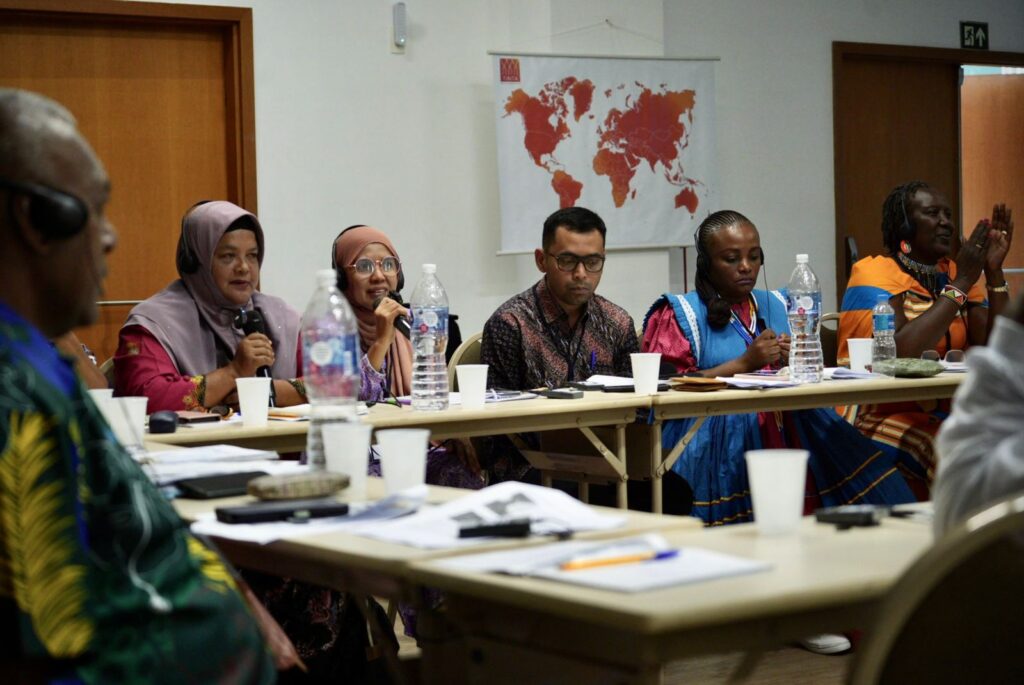May 15, 2025
By: Paula Alvarado
As the world gears up for the 2025 United Nations Ocean Conference in Nice, where deadlines and declarations will once again flood the global agenda, a quieter revolution is underway far from the marble halls of diplomacy. On the tropical coast of Itacuruçá, Brazil, small-scale fisher leaders from four continents gathered not to plead for recognition, but to assert it.
The Artisanal Fishers Exchange Brazil 2024 brought together leaders from communities in Latin America, Africa, Asia, and Europe—many of whom live and die by the tides. For them, the ocean is not an abstract blue economy or a footnote in climate negotiations. It is their past, present, and future.
“We are not just fishers—we are guardians,” said Zoila Bustamante, a Chilean representative of ULAPA. “We know how to manage the ocean because we live with it every day. But we are kept out of the rooms where decisions about our survival are made.”
Their message is clear: small-scale fishers must not be left behind in global ocean governance. With over 90% of the world’s fishers working in small-scale operations, this isn’t just a matter of justice—it’s a matter of survival for the ocean itself.
From the margins to the center
Small-scale fishers operate in a world increasingly squeezed by industrial fleets, climate impacts, and exploitative trade dynamics. The Exchange report documents how these communities, often sidelined, are building alternatives: cooperatives in Mexico cutting out middlemen, digital platforms in Brazil boosting direct sales, and eco-certifications in Thailand raising product value.
But beyond economics, participants pushed for political transformation.
“We don’t want to be consulted after the fact,” said Flavio Diniz Gaspar Lontro of Brazil’s CONFREM. “We want a seat at the table—before the quotas are set, before the zoning lines are drawn.”
This demand lands as ocean negotiations enter a critical phase. According to the World Resources Institute (WRI), 2025 marks a “make-or-break moment” for ocean action, with opportunities to align ocean stewardship with climate justice, food security, and livelihoods. But too often, policy processes favor abstract metrics over lived experience.
The fishers gathered in Brazil argue that without their participation, such policies will fail—because they miss the knowledge that only generational, place-based stewardship provides.
Living proof of sustainability
If sustainability were measured in centuries instead of policy cycles, small-scale fishers would already be celebrated as global leaders.
In Brazil, CONFREM’s “Naval Construction Project” is building fibreglass canoes—low-emission, ocean-ready vessels—based on traditional designs. In Gabon and India, mangrove restoration is led by women who combine ancestral knowledge with climate resilience science. In Fiji and Indonesia, co-managed marine areas are reviving fish stocks and supporting local governance.
These aren’t boutique experiments; they are scalable, low-cost, and rooted in the UN Sustainable Development Goals. They also align perfectly with WRI’s call for 2025 to be a turning point for inclusive ocean action.
Yet, these solutions rarely receive the political or financial support given to large-scale tech or industrial interventions.
Storytelling as survival
One powerful session at the Exchange—facilitated by Movilizatorio—focused on the power of storytelling. Fishers learned how to translate their realities into narratives that cut through bureaucratic fog and reach public consciousness.
“Data is important,” said Dani Setiawan from Indonesia’s KNTI, “but a story can travel across oceans and policies. Our stories show the cost of being ignored—and the beauty of being heard.”
As the UNOC 2025 approaches, these stories must be front and center. Not as sentimental tokens, but as evidence-based strategies for saving our seas. From the Andaman Coast to the Atlantic, these communities are living proof that a different ocean future is possible.
Call to Action: A Global Governance Reset
What fishers are asking for is not charity, but parity. The 2025 Ocean Conference must institutionalize participation of small-scale fisher representatives in decision-making. Not just inside events or stakeholder sessions—but within core negotiating bodies.
Regional platforms like ULAPA and AWFISHNET already demonstrate that such participation can be effective. Their members propose practical reforms—from fair trade access to climate-resilient gear—and their transnational networks are growing stronger.
The global community has a choice: continue sidelining the people who know the ocean best, or finally make space for them in the governance of its future.
As Bustamante warned:
“Without us, the ocean cannot survive. And without the ocean, neither can we.”
